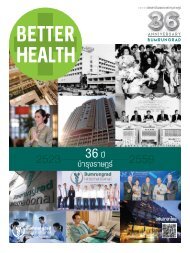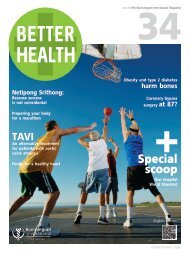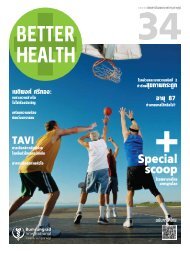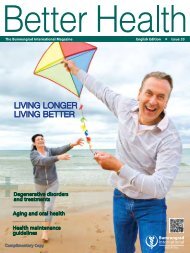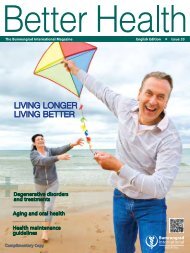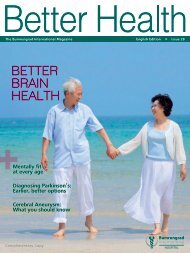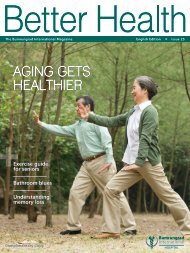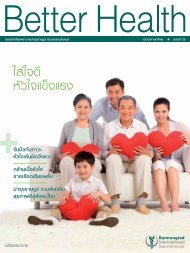All pdf BH Issue 33 Eng
Create successful ePaper yourself
Turn your PDF publications into a flip-book with our unique Google optimized e-Paper software.
Have your doctor review your medications and point<br />
out those that may suppress appetite.<br />
Consult a doctor or nutritionist for recommendations on<br />
nutritional supplements and appropriate diet.<br />
8. Hearing problems<br />
Hearing loss problems are common in older people. Hearing<br />
loss warning signs are the inability to perceive high-pitched<br />
tones or high-frequency sounds such as a<br />
female voice or high-key music, and the<br />
inability to understand conversations<br />
in noisy venues. Bad hearing<br />
degrades the quality of life because<br />
it limits social interaction and<br />
denies simple pleasures like<br />
listening to music or watching TV.<br />
6. Dizziness and vertigo<br />
Older persons are prone to<br />
dizziness and vertigo, which<br />
frequently lead to falls. Causes<br />
include low blood pressure or<br />
the side effects of medication<br />
(painkillers, tranquilizers, or<br />
anticonvulsants), vertigo, cardiac<br />
arrhythmias, anemia, and anxiety.<br />
Prevention and care<br />
Determine the cause and change the behavior.<br />
Move carefully, particularly when standing up from<br />
sitting or lying positions.<br />
Use canes, crutches, walkers, or handrails to assist<br />
with balance.<br />
7. Malnutrition and eating disorders<br />
There are many causes to eating disorders and the<br />
insufficient intake of food that leads to malnutrition. They<br />
include dental problems, problems with<br />
swallowing, decreased appetite,<br />
weight loss, diseases and the side<br />
effects of medications that suppress<br />
appetite, depression or dementia,<br />
and various chronic diseases.<br />
Malnutrition in older persons<br />
exacerbates infections and causes<br />
osteoporosis, muscle atrophy, and<br />
lethargy.<br />
Prevention and care<br />
In case of severe hearing loss, where the patient is barely<br />
able to perceive sound (especially in both ears) and<br />
becomes unable to communicate with others, hearing<br />
aids might alleviate the problem.<br />
Family, friends, and caregivers should speak closely and<br />
slowly, in low tones, and maintain eye contact when<br />
talking to older persons. Make sure that they can see<br />
the speaker’s lips and choose venues that do not have<br />
loud background noise.<br />
9. Vision problems<br />
Diseases such as cataracts, glaucoma,<br />
and macular degeneration can harm<br />
an older person’s vision, impacting<br />
their quality of life.<br />
Prevention and care<br />
Older persons should have annual<br />
eye exams to check for problems<br />
before they arise and become untreatable<br />
and irreversible. Finding disorders<br />
in the early stages results in a better chance for successful<br />
treatment.<br />
Don’t neglect emotional care. “With so many physical<br />
issues involved in elderly care, it’s easy to neglect mental<br />
health problems, which are just as equally important,”<br />
Dr. Lily says. “Older persons should strive to maintain<br />
an active and curious mind and try to avoid emotional<br />
stressors. Family members, friends, and caregivers play a<br />
key role in helping elders live happily. Treating them with<br />
gentleness, compassion, and genuine interest are at the<br />
heart of effective care.”<br />
Prevention and care<br />
Consult a doctor to find and treat any possible causes.<br />
Have a regular dental check-up, at least once a year.<br />
Dining with family or friends can improve the appetite<br />
and nutrition.<br />
Prepare food in easy to eat and digest portions.<br />
11



